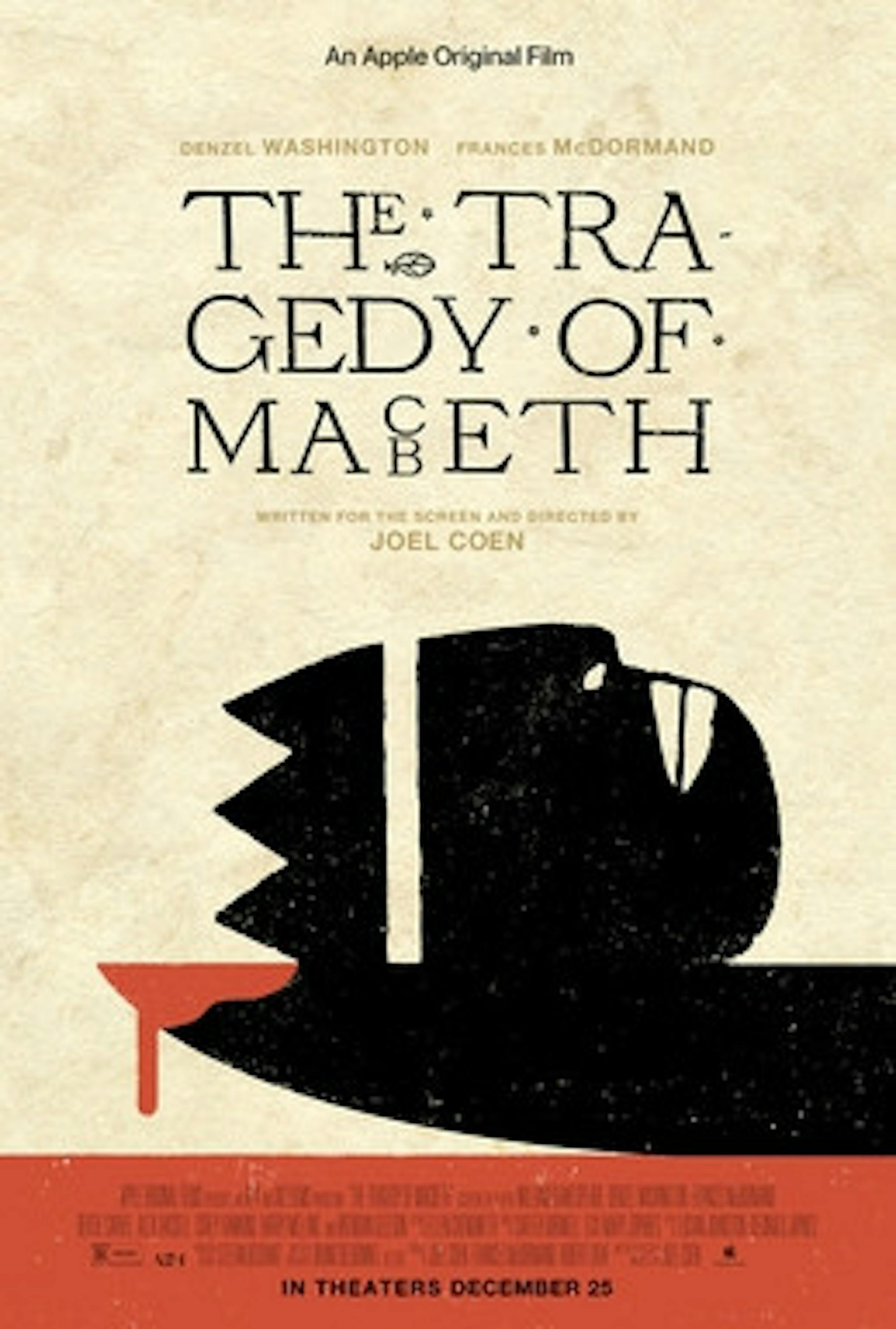Joel Coen’s "The Tragedy of Macbeth" (2021) — a modern cinemascape of the iconic Scottish Shakespearean tragedy — is told in vivid pools of light and sharp-edged voids of shadow. Every point within and throughout the film opposes all other points; it is so expansive and amorphous and yet full of clean cut lines and sharp pointed corners. “Macbeth,” which follows the titular newly appointed Thane of Cawdor as he loses himself to his hunger for power, has been released in theaters and is available to stream through Apple TV Plus. The iconic story has had countless adaptations across film and theater, and here Coen and his team blend those two mediums to create a unique and singular atmosphere which shrouds the story in visual markers that match the emotion and madness central to the story.
Most awe-inspiring in "The Tragedy of Macbeth" is undoubtedly its cinematography and production design. Cinematographer Bruno Delbonnel achieves an exquisitely sharp and crystalline sense of space and depth throughout the film. The setting and story become a void, never-ending in their capacity to shock and devolve into a downward spiral. It is a movie that bleeds, bleeding itself into itself into itself such that every image drips and drops into the next so seamlessly and so richly liquidated that it seems almost perpetual. The film is shot in black and white, and constantly uses hazy gray fogs and dark-laid shadows to connect each scene into the next; the film will push into the sky or fall within the different landscape settings, only to later push back out and arrive in different scenes so that it all becomes interconnected. Everything looks crisp and is placed carefully so that each frame feels like its own singular piece of art.
It is shocking to note that the entire movie was filmed on a soundstage. With how truly big the film feels, the fact that everything is constructed in such a minute and contained set is truly astounding. The walls of Macbeth’s own castle loom dark and high in pitch black pillars of silhouette; the sky is cloudy and flocked with ravens. There are tents and courtyards, roads which fork at weird ruins and rooms with circles of doorways and crossed open ceiling beams. Every set feels like it has a touch of unearthly architecture, and often lighting and fake rain will emphasize the wrongness of the scenes.
On a performance level, leads Denzel Washington as Macbeth and Frances McDormand as Lady Macbeth anchor the story in such a whirlwind dance which takes the audience into its own insanity. They are solemn at times and unhinged at others, always with an air of regality and poise which proves just how timelessly talented both are. Washington speaks with a profound sense of the reasoning behind Macbeth’s initial decisions and excellently portrays the departure from such reasoning as he falls ever deeper into his own fractured psyche. He is magnetic. McDormand matches this insanity time and again as she exudes the anger and impatience of her character. As Hollywood royalty themselves, they attract the attention that their characters need. It is impossible to look away from their actions, and even as the characters (especially Macbeth) push all others away, they bring the audience closer than ever.
The rest of the cast, too, shines across the board. Immediately captivating audience members is Kathryn Hunter, playing the role of the Three Witches, whose intense physicality (which extends from her voice to her facial expressions to her jerking and hyperextended arms) is so transformative and brings the audience immediately into the same apprehension and intrigue that Macbeth and Banquo feel when met with the wicked figures in the first introduction. Corey Hawkins (Macduff), Alex Hassell (Ross) and Harry Melling (Malcolm) also add so much depth to their characters, emotion to the story and intrigue to the conflicts.
Macbeth is a story that has been told and retold and adapted and reimagined countless times. The story is a classic, seeped in a nihilistic sort of clamor for power and the bloody horrors enacted in pursuit of such power. The prose and poetry of Shakespeare’s original is matched here with epic bouts of visual imagery and languid cinematic edits. It is a story that becomes so emotionally charged by the troupe of actors who expertly bring the words to life. Overall, this particular film adaptation is a masterclass of sense and thought. The filmmakers clearly put much thought and care into their artistry, so much so that the deceit and the madness seem to sweat through the screen.






